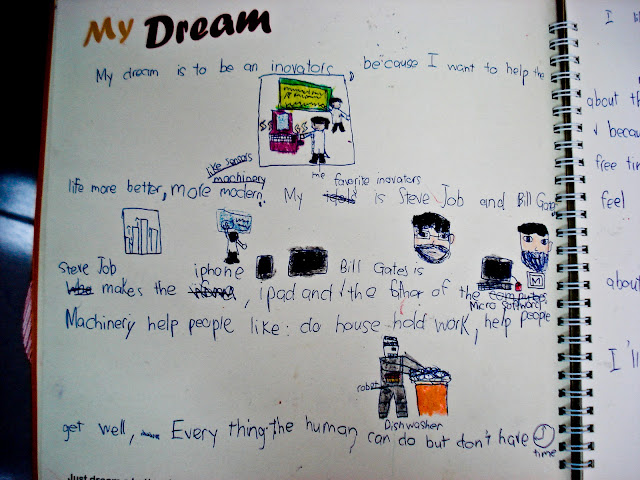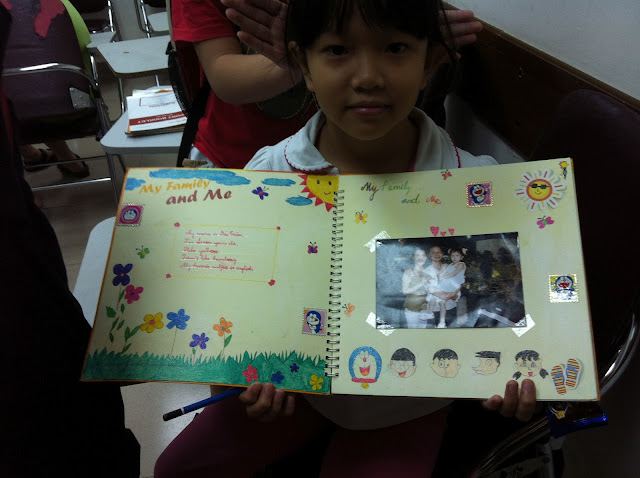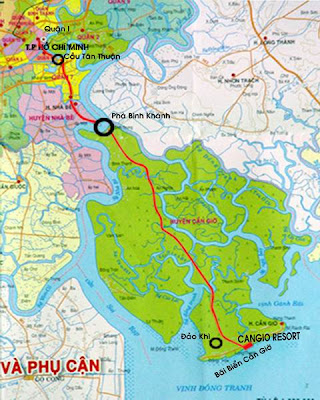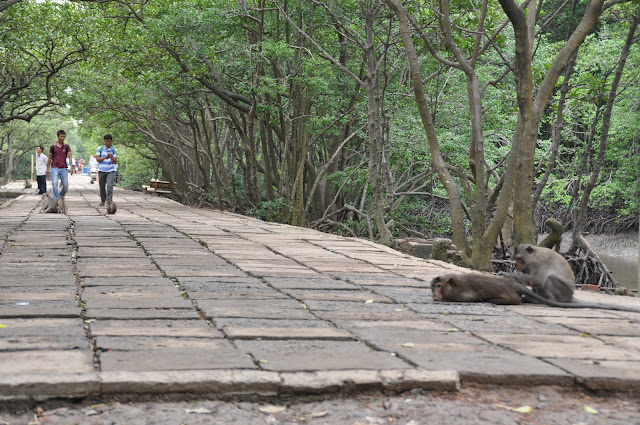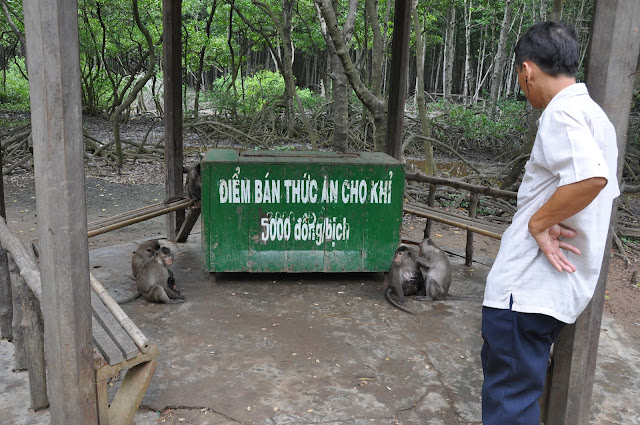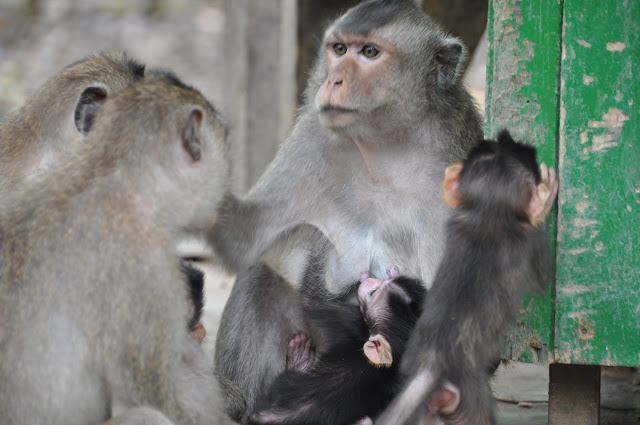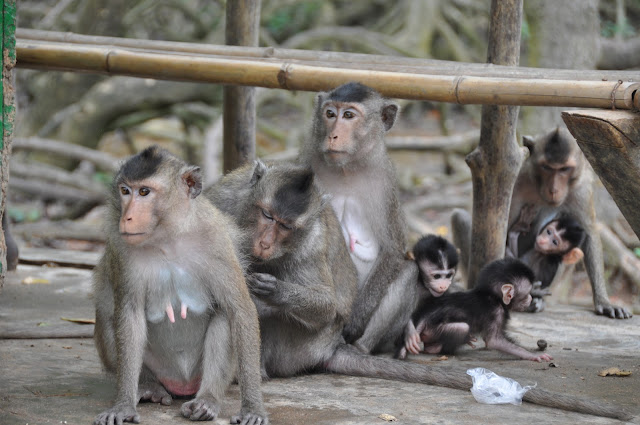Last Friday, we made a short day trip to Can Gio island, which is a rural suburban district that hugs the southeastern side of Ho Chi Minh City. It is an island swirled by canals and rivers and through which the Saigon river branches out into the ocean. At an area of 704
km², the district comprises a third of the whole city of Ho Chi Minh (2,095
km²). However, with just around 70,000 residents, it contains less than 1% of the whole population of Ho Chi Minh City (roughly 7,400,000 according to 2010 census), making it the most scarcely populated district in the city.
Can Gio is known for its biodiversity and makes for a great ecological trip for city dwellers as well as foreign tourists. It was in fact recognized as a Biosphere Reserve by UNESCO in 2000, the first of its kind in Vietnam. It is home to more than 200 animal species and 52 plant species. It is an important site of mangrove forests, of which a substantial amount had been obliterated by chemical warfare when the South Vietnamese and American armies tried to snuff out the northern guerrilla army from the overly-dense jungle, during the American War (better known as Vietnam War in the west). Since then, rigorous reforestation efforts have been made, earning the appraisal of global ecological organizations.
To make the 50km road trip from the city centre to the southern coast of Can Gio, we donned on long-sleeved clothes, face masks, and sunglasses, and at 8 am rode our motorbike through downtown, District 4, and to the far tip of District 7. There, we payed 5,500 dong (about 25 cents) to line up at the Binh Khanh ferry dock, where a throng of motorbikes waited under a small garage-like station, alongside a road reserved for larger vehicles. Defying our perceptions of a simple ferry boat, a hoard of buses, vans, and trucks slowly rolled through the gate and onto the ferry's platform, followed by the motorbike riders and pedestrians trinkling in the open spaces. Soon, like a mini Noah's ark for urban society, the ferry transported people and vehicles of all shapes and sizes across the river towards our destination.
In about 15 minutes, we arrived on the other side, and started riding on Rung Sac street, the spine of the district which leads all the way to the southern coast. The 35 km road was progressively breathtaking, plunging us to an ever-more lush and wild environment. The air was poignantly fresh and crisp, a drastic contrast from the neighbouring district across the river. We breathed in the smell of nature, and the smiles on our face as we rode on was testimony to our knowing that we made the right choice for this quick getaway.
In Can Gio, we visited "Monkey Island", which is an area inhabited by hundreds of long-tailed macaques that have become increasingly aggressive over the years as they got more comfortable with human contact. They jump on visitors and grab their belongings and clothes in search for food. Mike and I stayed paralyzed at the park entrance for a while, watching the visitors yelping and being harassed by monkeys that guarded the boardwalk entrance. At the end, Mike was too scared to go into the park, but I put on my raincoat (even though it wasn't raining) to form a seamless shield around my body and I must say that walking through the boardwalk was one of the scariest things I've done in a very long time! I felt like I was walking through a haunted house.
I managed to dodge the monkeys for the most part, but at the end, upon exiting the park, I was bullied by a few groups of monkeys, in the form of some teeth-baring monkeys grabbing on and pulling my raincoat from the bottom as the gang formed a circle around me, while I shouted and tugged my coat back and tried backing away like a helpless victim. Thank God there were park officers on site to yell for the monkeys to stop.
At the park there was also a sanctuary for saltwater crocodiles, where a boardwalk takes you within an enclosed natural swamp zone full of crocodiles making low grumbling noises. The ambiance is extremely creepy as you walk along the unreassuring wooden planks and where you know that a sudden fall into the waters would mean instant death for you.
There are many other things we had skipped out on doing for the day's trip, such as taking a wild speed-boat ride around the salt-marsh waters, visiting the bird sanctuary, staying afloat on a natural pool with extremely high concentration of salt or visiting the guerrilla army base of Rung Sac. Instead, we went down to the beach for some fresh seafood. A kilo of crab and a large serving of exquisite tender squid cost us 700,000 dong (about $35). Down at the beach, locals bathed and played in muddy brown water along a stretch of dark tar sands. In the horizon on the left side of the ocean, one could make out the 3 large hills that characterize Vung Tau city.
Our ride home took exactly 2 hours, the same length of time taken to get to the island, and we got caught in a massive rainstorm. We were not too bothered by the downpour, however, as we wore our raincoats and our sunglasses, allowing us to face the storm head-on. It was kind of exhilarating to fly through the rain on a wide open empty road curtained by lush greenery on both sides. It is not difficult to enjoy the presence of nature's powerful forces when you find yourself in such beautiful wilderness. Can Gio is truly the "green lungs of Saigon", functioning not only as an air filter to the city and a foliage net to diffuse incoming hurricanes, but as a true fresh natural haven where city dwellers can make a quick trip to to rejuvenate the body and mind.
 |
| Buying tickets at the ferry dock; pricing proportionate to size of vehicle |
 |
| Ladies trying to sell lottery tickets to the motorists waiting in line |
 |
| The Binh Khanh ferry: a Noah's Ark for all kinds of vehicles |
 |
| Lottery ticket sellers also come on the ride to continue their hustling |
 |
| The main road on Can Gio Island, bringing us deeper and deeper into lush wilderness |
 |
| Tickets for "Monkey Island" (Đảo Khỉ); 30,000 VND ($1.50) for locals, 60,000 VND ($3) for foreigners |
 |
| Ecological Museum |
 |
| Mike was too scared to cross the main boardwalk into Monkey Island; monkeys prance everywhere, ready to attack |
 |
| The scariest boardwalk in the world! Very unnerving! You can be the monkey's next target! |
 |
| This little boy cried! He must have been frightened by the monkeys!!! |
 |
| It's okay... his posse is there for him... |
 |
| My raincoat will protect me... right??? |
 |
| Boardwalk into the semi-wild saltwater crocodile sanctuary |
 |
| Mangrove forest |
 |
| Can Gio Beach |
 |
| The three hills in the distance are part of Vung Tau City |
 |
| Dark clouds ahead foreshadows the heavy downpour |
 |
| Back on the ferry... and another lottery ticket lady at work... |























